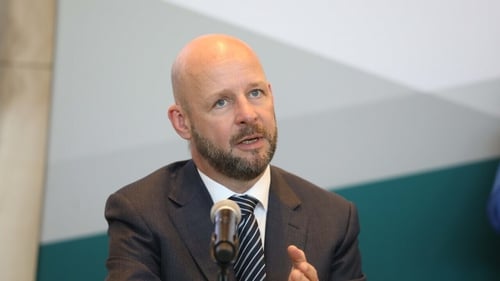
No major increase of virus spread since measures eased
An expert tasked with measuring the spread of the Covid-19 for the National Public Health Emergency Team has said that since restrictions began to be eased on 18 May, all indicators suggest there has been no significant increased spread of the virus.
Professor Philip Nolan, chair of the Irish Epidemiological Modelling Advisory Group for NPHET, said this shows that Irish people "have learned how to go about their business and not spread this virus".
Prof Nolan said that individual responsibility will be central to continued suppression of the virus.
Speaking on RTÉ's Morning Ireland, he urged people to continue to maintain social distancing, exercise hand and cough hygiene, to wear face coverings, and to self-isolate and contact their GP if showing symptoms, for testing and tracing.
He said if this is done successfully it is possible over time "in a cautious manner" to rebuild many activities and not spark off further waves of infections.
However, he said that any step forward carries a risk and requires constant monitoring.
Prof Nolan said there is always going to be a risk and for a long time into the future we will have to limit social and physical contacts to what is necessary for our well-being and to restart the economy.
He said the virus will decline if community infections remain low and the reproduction rate of the virus is kept below one.
Half of the cases emerging now are contacts of known cases, for example in households, he said.
In relation to easing restrictions, Prof Nolan said the Chief Medical Officer and other members of NPHET are observing what happens in other countries.
He said it takes time for a disease to re-emerge - and different cultures and countries in Europe behave differently so we need to be careful in comparing behaviours.
He said in relation to schools that class and school structures vary across countries and this gives us useful evidence and information but he said we must be careful in jumping to any conclusions.
Read more:
Childcare providers express concern for future
Broadband concerns cause headaches for remote workers
Meanwhile, the Taoiseach has said that while he would like to accelerate the Government's roadmap, a judgement call cannot be made until next week.
Speaking on FM104 this morning, Leo Varadkar said it is possible for phases to be brought forward - if virus numbers are kept under control.
"The reason we can’t make a judgement call yet is because it's only two weeks after restrictions are relaxed that you know if the virus is spreading again, that's why we have three week intervals", he said. "So we'll know next week if we’re on track".
Mr Varadkar said that we are "going in the right direction" but if the numbers take a turn for the worse next week, that would be a cause for concern.
He said he has spoken to a number of business owners who are keen to reopen, but "the worst thing that could happen" to them is if we "jump the gun" and end up with a second lockdown.
He urged people who can wear face coverings to do so, and said the two-metre social distancing guideline remains in place for now. He emphasised that this is a guideline and not the law.
"Differing bodies give different advice, but if someone has the virus, it's safer to be two metres away than one", he said.